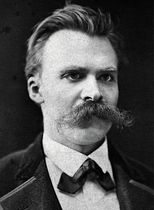THUS SPOKE ZARATHUSTRA
|
|
"God is dead...What after all are these churches now if they are not the tombs and sepulchers of God?" So begins Friedrich Nietzsche in his most disturbing and prophetic work--Thus Spoke Zarathustra. What are the consequences of living in a work without any transcendent meaning, purpose, or value? If God is dead, then where are we to find the meaning for our lives. The answer for Nietzsche is "in ourselves." In the recognition of our own freedom to choose the kind of lives that we would live, Nietzsche believes that certain human beings at least have the possible to become something greater than they might otherwise be. The term Nietzsche uses to describe this new, more perfect form of human being is Übermensch (usually translated as "Superman" or "Overman.").
|
|
As you read the selection from Nietzsche's Thus Spoke Zarathustra, be sure that you are able to answer the following questions:
Looking to read something else about this topic? Explore Alex Romeo's argument about why YOU are Nietzsche's last man in "We are the Last Men" (Wisdom's Haven, 2013).
|
ZARATHUSTRA
|
Select one of the following question to reflect upon after having gone through all of the above steps:
|
© Stephan T. Mayo, 2013. All of the content on this webpage is copyright. The materials on this webpage may not be modified, posted or transmitted without the prior consent of the author. Permission is granted to print out copies for educational purposes and for personal use only. No permission is granted for commercial use.




